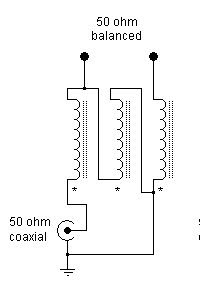My need was simple. I had been reading about antennas used to detect emissions from Jupiter and the Sun. I recognized that more than a few people were using folded dipoles. These are antennas that are a lot like a normal dipole but has both ends folded on each other and connected. This provides a wider bandwidth and allows wider tuning. To facilitate this a balun is requires that matches 4:1. To put it in terms that I think I understand, the antennas resistive component is 4 times more than that of a standard ham transceiver.
Once the kit came in the mail I followed the instructions as best as I could, assembled the folded dipole, and installed everything. I turned everything on and nothing was heard. A simple random length of wire provided better reception. I took everything down and tossed the balun on my workbench.
About a week later I picked things back up. In the time leading up to this I had a read a little on baluns at the following page. I assumed that I wound the toroid wrong and decided to rewind it. However this time I would try to wind a 1:1 balun and just use it with a regular dipole Also rather than hooking everything back up to an antenna I decided to use an antenna analyzer with one side of the toroid hooked into a precise 50 ohm load and the other the analyzer. The instructions had the following diagram for how things should be wired and wound.
I wound six turns around the toroid and ran a test. The following table shows the results.
As can be seen the performance was horrible. I really didn't know what was wrong. I made sure that I wound things properly and in the right direction.. I just could not get good results. I decided to go back to the drawing board. I watched a few videos of other hams winding their own baluns and it appeared that no one used the method described in the instructions I had. They actually wound a total of four coils. Two on each side and respective colors twisted together at each end. I decided to try this out and use ten turns on each side of the toroid. As you can see in the following table the results were VERY good. I was under an SWR of 1.5 across all the ham bands.
At this point I can only assume that the hardware, such as the connectors, is some how detuning things a bit. I might try to remove a few turns on the toroid and see if that helps things a bit.
More to come.
UPDATE: I removed two turns on each coil bringing it down to eight instead of ten and got mildly better results. At this point I think I am done with this. I closed it up and will attached it to the dipole I currently have up which tunes roughly around 20Mhz.








No comments:
Post a Comment